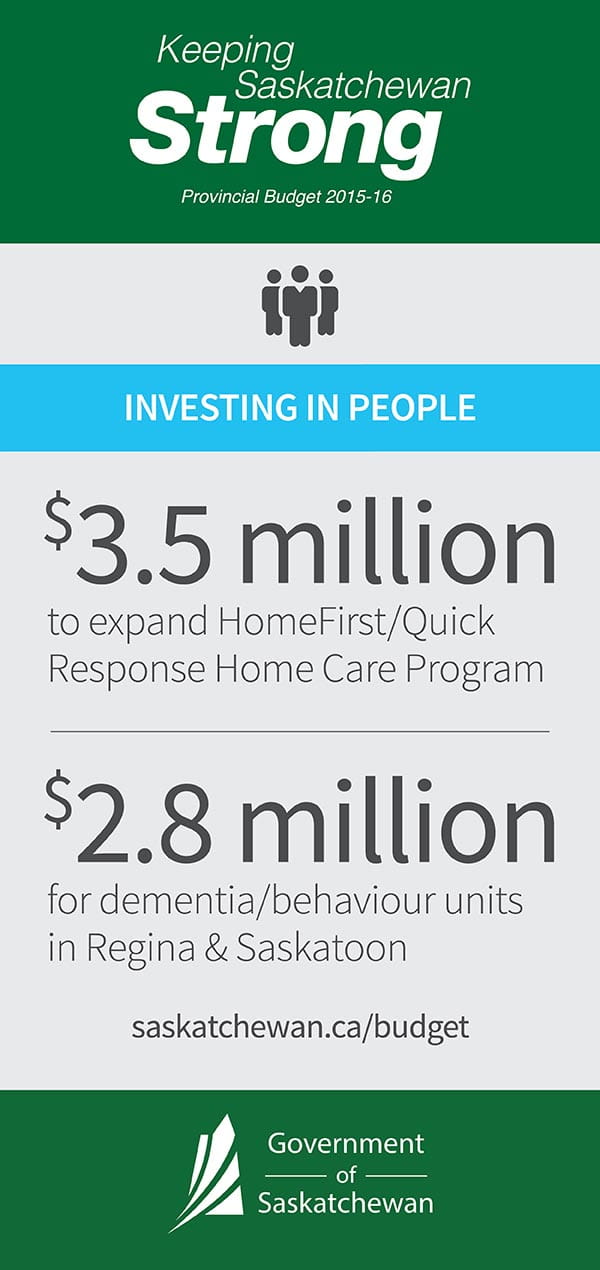Released on March 18, 2015
The 2015-16 Budget continues to invest in programs and services that benefit seniors. The Government of Saskatchewan recognizes support is needed to ensure the safety, comfort and respect of seniors in the province.“Our government is committed to providing timely, quality care for Saskatchewan seniors,” Health Minister Dustin Duncan said. “This year’s budget provides targeted funding that supports seniors staying in their homes as long as possible and improving quality of long-term care for those who need it.”
The 2015-16 Ministry of Health Budget provides an additional $10 million investment into new targeted funding to support seniors living in their own homes as well as improving the quality of long-term care. Highlights include:
- $3.5 million to support seniors who wish to remain at home as long as possible by enhancing the Home First/Quick Response Program in Regina Qu’Appelle, Saskatoon, and Prince Albert Parkland health regions and expanding the program in the Prairie North Health Region to an additional site. This brings the total funding for Home First/Quick Response to $8.0 million.
- $2.8 million in capital renovations in Regina Qu’Appelle Health Region and Saskatoon Health Region to develop specialized units for individuals with dementia or challenging behaviours.
- $2.0 million in individualized funding that provides increased choice and flexibility for home care clients to choose their care provider, providing more services and eliminating the current wait list for funding in the Five Hills, Prairie North, Regina Qu’Appelle and Saskatoon health regions.
- $1.0 million annually to support Purposeful Rounding, the practice of seeing to the needs of long-term care residents within a prescribed amount of time, improving resident safety and satisfaction while ensuring better clinical outcomes.
- $700,000 to develop a new Geriatric Program in the Regina Qu’Appelle Health Region, including the recruitment of a geriatrician to Regina, to provide a range of services to seniors, including support for quality in long-term care.

Through the Ministry of Social Services, the province will fulfill its four-year commitment to increase benefits under the Seniors Income Plan (SIP) and Personal Care Home Benefit.
In 2015-16, a total of $26.5 million will be invested in the Seniors Income Plan to increase maximum monthly benefits by $10 per month, to $270 for single seniors and $235 for each member of a senior couple. Approximately 14,000 seniors will benefit from the increase that takes effect in July 2015.
“Our government has tripled the monthly benefit for single seniors under the Seniors Income Plan, from just $90 in 2007 to $270 this year,” Social Services Minister Donna Harpauer said. “Saskatchewan seniors deserve appropriate care, adequate funding and our respect.”
Seniors receiving SIP benefits are also entitled to additional health benefits such as one free eye examination every 12 months, chiropractic services (to a maximum of 12 services per year), a reduced Prescription Drug Plan semi-annual deductible, a home care subsidy and an exemption from many of the charges under the Saskatchewan Aids to Independent Living Program.
Government will meet its commitment to increase the monthly income threshold by $50 to $2,000 for the Personal Care Home Benefit (PCHB) in July 2015. Investment in the PCHB will total $3.7 million in 2015-16. The benefit, accessed by about 800 seniors, was introduced in 2012 to assist lower income seniors with the cost of living in a personal care home.
As well, government’s recent announcement of changes to the affordable housing program, converting 2,700 units to social housing, will allow hundreds of seniors to pay less rent on their government-owned and operated home.
-30-
For more information, contact:
Tyler McMurchy
Health
Regina
Phone: 306-787-4083
Email: tyler.mcmurchy@health.gov.sk.ca
Cell: 306-537-3594
Trish Alcorn
Social Services
Regina
Phone: 306-787-0916
Email: trish.alcorn@gov.sk.ca
Cell: 306-536-1479
